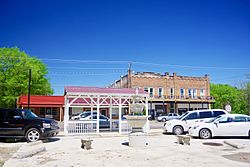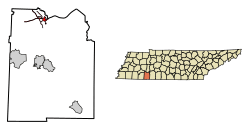Saltillo, Tennessee facts for kids
Quick facts for kids
Saltillo, Tennessee
|
|
|---|---|

Buildings along Main Street (SR 69)
|
|

Location of Saltillo in Hardin County, Tennessee.
|
|
| Country | United States |
| State | Tennessee |
| County | Hardin |
| Area | |
| • Total | 3.08 sq mi (7.96 km2) |
| • Land | 3.07 sq mi (7.95 km2) |
| • Water | 0.00 sq mi (0.01 km2) |
| Elevation | 413 ft (126 m) |
| Population
(2020)
|
|
| • Total | 420 |
| • Density | 136.76/sq mi (52.81/km2) |
| Time zone | UTC-6 (Central (CST)) |
| • Summer (DST) | UTC-5 (CDT) |
| ZIP code |
38370
|
| Area code(s) | 731 |
| FIPS code | 47-66340 |
| GNIS feature ID | 1300596 |
Saltillo is a small town in Hardin County, Tennessee, United States. It is located on the left side of the Tennessee River. In 2020, about 420 people lived there. Saltillo is about 12 miles north of Savannah.
Contents
History of Saltillo
Saltillo was started by Thomas Shannon in October 1822. He traveled to the area on a keelboat, which is a flat-bottomed boat used for rivers. He brought supplies, two helpers, and four other men. They set up camp near the Tennessee River.
Shannon's wife and seven children came by land. They brought 40 cattle to start a farm. However, most of the cattle died because they could not get used to the new environment.
In 1825, Shannon and his sons built the first house in Saltillo. It was a log cabin. Soon after, a store was built by Smith Hawkins. This store sold "dry goods," which are things like fabrics and non-perishable items. The area where this store was built is now called Hawkin's Landing.
More people moved to the area. Another store was built by Perry Hawkins, Smith's brother. Barges, which are flat-bottomed boats, began bringing goods regularly. People would travel to the Duck River to use a grist mill, a machine that grinds grain into flour.
In 1842, Thomas Davy bought the land that Thomas Shannon once owned. It was then called Davy's Landing. In 1849, Davy rented the land to Scott Terry. Terry renamed the area Saltillo. He named it after Saltillo, Mexico, because he was a soldier in the Mexican–American War. The Saltillo post office opened in 1850. Saltillo officially became a town in 1870.
Geography of Saltillo
Saltillo is located at 35°22′50″N 88°12′44″W / 35.380579°N 88.212119°W.
The United States Census Bureau says the town covers about 0.9 square miles (2.3 square kilometers). All of this area is land.
Population of Saltillo
| Historical population | |||
|---|---|---|---|
| Census | Pop. | %± | |
| 1880 | 263 | — | |
| 1890 | 354 | 34.6% | |
| 1960 | 397 | — | |
| 1970 | 423 | 6.5% | |
| 1980 | 434 | 2.6% | |
| 1990 | 383 | −11.8% | |
| 2000 | 342 | −10.7% | |
| 2010 | 303 | −11.4% | |
| 2020 | 420 | 38.6% | |
| Sources: | |||
In 2000, there were 342 people living in Saltillo. There were 155 households and 93 families. The population density was about 382 people per square mile.
About 20% of the people were under 18 years old. About 20% were 65 years or older. The average age in Saltillo was 46 years.
Economy of Saltillo
Past Economic Activities
Saltillo was once an important place for shipping goods. It sent out cotton and wood products called "staves" (used to make barrels) as late as 1861. At that time, the town had a church, a Masonic lodge, and two general stores. There were also several grist mills, two saw mills (for cutting wood), and two tanneries (for making leather). Saltillo was also known as a fishing town.
A clothing factory called H.I.S. was in Saltillo. It was a big employer for the town's residents. However, it closed around 1997.
Current Economic Activities
Today, many people in Saltillo work for themselves. Others work in bigger towns nearby. These towns include Lexington, Savannah, and Counce.
Arts and Culture in Saltillo
The buildings in Saltillo show different styles of architecture. Some buildings date back to the 1840s. These include an old farmhouse and buildings in the Greek Revival style.
The Parker House was built around 1906 by Luther Parker, who was a local doctor. It is now a place where people can stay, called a bed and breakfast. The Meady White House was built in 1847 by Meady White, who helped start the town. It shows both Greek Revival and Italianate styles. There are also cemeteries in the area that are older than the American Civil War.
See also
 In Spanish: Saltillo (Tennessee) para niños
In Spanish: Saltillo (Tennessee) para niños
 | William M. Jackson |
 | Juan E. Gilbert |
 | Neil deGrasse Tyson |

